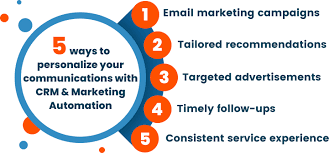In the dynamic realm of modern marketing, personalization at scale has emerged as a crucial strategy for engaging customers and enhancing brand loyalty. Leveraging Customer Relationship Management (CRM) systems for targeted marketing is not just an option but a necessity for businesses aiming to stand out in a crowded marketplace. This comprehensive guide delves into how CRM systems can be harnessed for effective and scalable personalization, driving significant improvements in customer engagement and conversion rates.
Understanding Personalization at Scale
Personalization at scale involves tailoring marketing messages and experiences to individual customers or segments of customers across large volumes of interactions. Unlike one-size-fits-all approaches, personalization leverages data and insights to create more relevant and impactful customer interactions.
The Role of CRM in Personalization
A CRM system centralizes customer data, providing a comprehensive view of each customer’s interactions, preferences, and behaviors. This centralized data repository is the foundation for implementing personalization at scale. By analyzing this data, businesses can segment their audience effectively, craft personalized messages, and deliver these messages through the most appropriate channels.
Key Benefits of Using CRM for Targeted Marketing
1. Enhanced Customer Segmentation
Effective customer segmentation is the cornerstone of successful targeted marketing. CRM systems offer advanced segmentation capabilities by grouping customers based on various criteria such as demographics, purchase history, and behavioral patterns. This segmentation allows businesses to design campaigns that resonate with specific customer groups, enhancing relevance and engagement.
2. Data-Driven Insights
CRMs provide robust analytics tools that offer actionable insights into customer behavior and preferences. By analyzing data trends, businesses can predict future customer needs and tailor their marketing strategies accordingly. This data-driven approach ensures that marketing efforts are aligned with customer expectations, improving the effectiveness of campaigns.
3. Improved Customer Engagement
Personalized marketing campaigns, powered by CRM systems, foster a deeper connection between the brand and its customers. By delivering tailored content and offers, businesses can engage customers more meaningfully. This personalized approach not only boosts engagement rates but also increases the likelihood of customer loyalty and repeat business.
4. Automation of Marketing Processes
CRM systems often come equipped with automation features that streamline marketing processes. Automated workflows can trigger personalized messages based on customer actions or predefined criteria. This automation ensures timely and relevant communication, reducing manual effort and increasing efficiency.
5. Comprehensive Customer Journey Mapping
Mapping the customer journey is essential for understanding how customers interact with a brand throughout their lifecycle. CRM systems offer tools for tracking and analyzing every touchpoint, from initial contact to post-purchase interactions. This comprehensive view enables businesses to craft personalized experiences that guide customers through their journey effectively.
Strategies for Effective Personalization with CRM
1. Leverage Behavioral Data
Behavioral data, such as browsing history and purchase patterns, is invaluable for personalization. CRM systems can track and analyze these behaviors to deliver targeted recommendations and offers. For example, an e-commerce platform can suggest products based on previous purchases, increasing the likelihood of conversion.
2. Utilize Predictive Analytics
Predictive analytics, enabled by CRM systems, helps anticipate customer needs and preferences. By analyzing historical data and trends, businesses can predict future behaviors and tailor their marketing strategies accordingly. This proactive approach ensures that marketing messages are relevant and timely.
3. Implement Dynamic Content
Dynamic content, which changes based on customer data, enhances personalization efforts. CRM systems can deliver dynamic content in emails, on websites, or through mobile apps, ensuring that each customer receives content tailored to their interests and needs.
4. Personalize Communication Channels
Different customers prefer different communication channels. CRM systems enable businesses to personalize interactions across various channels, such as email, social media, and SMS. By understanding channel preferences, businesses can deliver messages through the most effective medium.
5. Monitor and Optimize Campaign Performance
Continuous monitoring and optimization are crucial for effective personalization. CRM systems provide detailed analytics on campaign performance, allowing businesses to assess what works and what doesn’t. This data-driven approach enables ongoing refinement of personalization strategies for better results.
Challenges and Considerations
While CRM systems offer powerful tools for personalization, there are challenges to consider:
1. Data Privacy and Security
With the collection of vast amounts of customer data comes the responsibility to ensure data privacy and security. Businesses must comply with data protection regulations and implement robust security measures to safeguard customer information.
2. Integration with Other Systems
For seamless personalization, CRM systems need to integrate with other marketing and sales tools. Ensuring compatibility and data synchronization across platforms is essential for a cohesive customer experience.
3. Managing Data Quality
The effectiveness of personalization relies on the accuracy and quality of data. Regular data cleansing and maintenance are necessary to ensure that CRM systems provide reliable and actionable insights.
Conclusion
Harnessing the power of CRM systems for personalization at scale is a game-changer for modern marketing. By leveraging CRM capabilities for enhanced segmentation, data-driven insights, and automated processes, businesses can deliver highly personalized experiences that drive engagement and conversion. Embracing these strategies not only enhances customer satisfaction but also positions businesses for long-term success in a competitive market.
